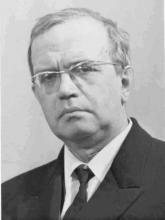M. O. Kilchevskyi was born in 1909 in Kamianets-Podilskyi in a teacher’s family. Having begun to study at the KPI, he graduated in 1933 from the Kyiv Physics-Chemistry-Mathematics Institute, specializing in solid mechanics. M. O. Kilchevskyi began teaching still a student, in January 1933. In 1936 he defended a candidate’s thesis, in 1940 a doctorate thesis, in 1961 he was elected to be a corresponding member of the Academy of Sciences of the USSR, in 1969 he became an academician of the Academy of Sciences of the USSR. Since 1938 M. O. Kilchevskyi had been the head of the Department of Mathematics at the Kiev Aviation Institute, at the same time he lectureed theoretical mechanics in Kiev Industrial (later Polytechnic) Institute. Since that time, his educational, scientific, research and social activities were associated with the Kiev Polytechnic Institute.
Prof. M. O. Kilchevskyi had been the head (1944 - 1961) of one of the largest departments of our University – the Department of Theoretical Mechanics. Since 1961 he worked as the head of the department of poliaggregative systems analytical mechanics of the Institute of Mechanics, Academy of Sciences of the USSR, and simultaneously – on a voluntary basis – as a consultant professor at KPI.
M. O. Kilchevskyi was a member of the USSR National Committee on Theoretical and Applied Mechanics, a member of the Presidium of the scientific and methodical council of Theoretical Mechanics at Ministry of Higher Education Institutions of the USSR, the Chairman of the Scientific Council on "General mechanics" issues at the Academy of Sciences of the USSR, a member of the editorial board of the journal "Applied Mechanics".
The characteristic features of M.O. Kilchevskyi’s researches always were problems actuality, originality and clarity of problems setting, research accuracy, depth of analysis. "M. O. Kilchevskyi’s work left the mark in our science, his achievements were preserved in books. I do not know anyone among our generation, who expressed so many original ideas and approached him on the sum of knowledge", - wrote the correspondent member of the Academy of Sciences of the USSR A. I. Lurie in 1979.
The analytical methods of the theory of plates and shells, developed by prof. Kilchevskyi, allow not to introduce simplified kinematic assumptions, but use of tensor analysis in conjunction with the variational principle of analytical mechanics and other methods of mathematical analysis transpose three-dimensional problems of the solid mechanics to two-dimensional problems of plates and shells. Of great practical importance are the methods for analytical study of dynamic processes in systems of coaxial shells containing liquid and heated gas. For a series of works on the theory of shells M. O. Kilchevskyi received the State Prize of the Ukrainian SSR in the field of science and technology in 1979 (posthumously).
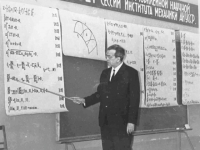 Evacuated during the war and being the head of the Department of Theoretical Mechanics, Tashkent Institute of Railway Transport Engineers, Mykola Kilchevskyi began to investigate the processes of contact compression of solids and impact, particularly relevant for transport in wartime. The results of these studies were published in monographs in 1949, 1969 and 1976, the last of them " Dynamic compression of solids. Impact " was esteemed worthy in 1977 by the Academician A. N. Dynnyk Award. Prof. A. I. Lurie wrote: "It would be a mistake to think that this book is the sum of previously known results on the theory of impact, rather it is the result of many years of considerations made by M. O. Kilchevskyi on one of the most urgent and difficult problems of general mechanics and continuum mechanics ... There is no need to enumerate the rich content of the book ... The originality seal is evident in every chapter of the book…"
Evacuated during the war and being the head of the Department of Theoretical Mechanics, Tashkent Institute of Railway Transport Engineers, Mykola Kilchevskyi began to investigate the processes of contact compression of solids and impact, particularly relevant for transport in wartime. The results of these studies were published in monographs in 1949, 1969 and 1976, the last of them " Dynamic compression of solids. Impact " was esteemed worthy in 1977 by the Academician A. N. Dynnyk Award. Prof. A. I. Lurie wrote: "It would be a mistake to think that this book is the sum of previously known results on the theory of impact, rather it is the result of many years of considerations made by M. O. Kilchevskyi on one of the most urgent and difficult problems of general mechanics and continuum mechanics ... There is no need to enumerate the rich content of the book ... The originality seal is evident in every chapter of the book…"
In the last years of life Mykola Kilchevskyi once again focused on the construction and justification of continuum systems Hamiltonian and Lagrangian mechanics. It was justified that the variational principles of mechanics are applied to solid medium. The results are published in the monograph "Analytical mechanics of continuum systems". Altogether he has published over 200 scientific works, including 9 monographs and 11 textbooks. In 1977 he received the honorary title of Honored Scientist of the USSR, he was decorated with two Orders of the Labor Red Banner, the Order "Badge of Honor", medals.
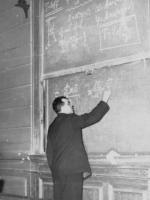 M. O. Kilchevskyi was an outstanding, gifted in many fields personality. One of such talents was his lecturing skill. His magnificent lectures have always attracted "strangers". These were either the lecturers from other high schools, or former students, who became venerable specialists, and, immutably, his collegues from the department, postgraduates. Comprehending pedagogical skills, ability to think abstractly and to make general conclusions, the attendants were taught thoughtful and thorough understanding of the essence of classical mechanics.
M. O. Kilchevskyi was an outstanding, gifted in many fields personality. One of such talents was his lecturing skill. His magnificent lectures have always attracted "strangers". These were either the lecturers from other high schools, or former students, who became venerable specialists, and, immutably, his collegues from the department, postgraduates. Comprehending pedagogical skills, ability to think abstractly and to make general conclusions, the attendants were taught thoughtful and thorough understanding of the essence of classical mechanics.
Mykola Kilchevskyi was a talented pedagogue, excellent lecturer, responsive and principal educator. He paid much attention to education of scientists and engineers. Many of his former students and postgraduate students became academicians, State Prize Laureates, Professors, Doctors of Science. He prepared 65 Candidates of science.
A correspondent wrote in the article about academician B. E. Paton:
"Theoretical mechanics was lectured to the future scholar by Professor M. O. Kilchevskyi who had brought his students into the world of big science safely, confidently and persistently. Sometimes colleagues in the department warned Mykola Kilchevskyi:
- One should not complicate the course so much – you are not preparing postgraduate students.
To such "prompts" professor answered with a kind smile:
- Certainly, not postgraduate students, but engineers, who are not only to replace us, but also to make much more.
To professor Kilchevskyi theoretical mechanics transformed into a kind of a bridge between the classic, traditional for technical high school subjects (mathematics, physics) and purely specialized ones, in a bridge, linking them together using the latest available scientific data. This very impressed Borys Paton, who understood that the method of Mykola Kilchevskyi was the key to solving major "engineering problem": to learn to understand the concrete in the abstract and, vice versa, be able to differentiate an abstract in the sum of specific factors, phenomena and processes. ".
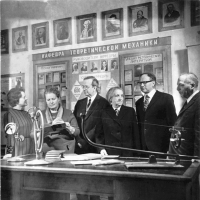 In 1972 Mykola Kilchevskyi was asked a few questions by a postgraduate V. V. Piven, then a correspondent of a Student Research Society(SRS) KPI "Search". Let us consider the two answers of M. O. Kilchevskyi.
In 1972 Mykola Kilchevskyi was asked a few questions by a postgraduate V. V. Piven, then a correspondent of a Student Research Society(SRS) KPI "Search". Let us consider the two answers of M. O. Kilchevskyi.
Question 1:
- Professor Kilchevskyi, you are teaching a long time in our high school and know the institute life. What, in your opinion, is the role of SRS in educating students - researchers, future scientist, highly qualified specialists?
Answer::
- Active participation in the experimental work is essential in preparing students for future creative work. Students need to learn all the time to improve their knowledge, develop research skills, broad theoretical outlook ... Student research societies (SRS) should provide great assistance in carrying out these tasks
Each teacher’s mission is to pay unflagging attention to the SRSs and SDDs (Student Design Departments) ... It is very important that students perform actual research tasks are which are dealt with in the departments.
Question 2:
- Some students believe that “satisfied” marks at the institute will not prevent them from becoming excellent professionals after graduation. What is your opinion? Does this point of view have a right to exist?
Answer:
- No, it doesn’t . The one, who has accustomed to such views since being a student, will not get rid of them, which is very dangerous, at the workplace as well.
In the era of scientific and technological revolution important fundamental knowledge that is acquired in the study of general subjects such as philosophy, mathematics, theoretical mechanics, physics, descriptive geometry, etc., promotes the development of students' scientific thinking.
At present the equipment quickly becomes obsolete, and engineers, having very specialized practical knowledge, quickly lose particularly important achievements of higher education, which consist in the ability to think scientifically, to make general conclusions, to successfully apply their new knowledge in creative work.
Technical education should be uphold by basic general knowledge that are more sustainable in the era of scientific and technological revolution. A student, who is satisfied with satidfied marks, does not develop a deep ability to analyze and think, robs himself.
The prominent world-known scientist M. O. Kilchevskyi spared no time neither effort to improve the theoretical mechanics teaching technique, ensuring along with fully keeping to the ideological part of the course the greatest flexibility and elegance of presentation. He wrote 11 books on theoretical mechanics (for higher technical schools, universities and pedagogical institutes), which are among the best in classic literature. Many generations of students and many generations of highly qualified teachers were educated with the help of his books.
Prof. Kilchevskyi never stayed away from the actual problems of mechanics. In one of the evenings in the early 60s of the last century, the big physical auditorium of the KPI could not accommodate all those wishing to get to the scientific seminar, led by prof. Kilchevskyi and prof. Holubentsev, dedicated to contradiction of the sensation that had recently appeared in popular science periodicals.
It was a so-called Dean drive – a thruster that (as correspondents have written) raised itself.
The report has began with making of a well-known task from I. V. Meshcherskyi’s problem book in theoretical mechanics. It turned out that the authors of the "sensation" have not noticed one small detail in the description of the invention and the Dean drive was just a thruster "jumping" from step to step.
Mykola Kilchevskyi valued the problem book by I. V. Meshcherskyi and often said that before you take up the study of any mechanical system, you must first search its model in that problem book.
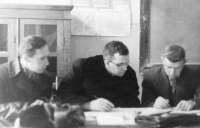 Prof. Kilchevskyi paid much attention to the work of beginning teachers, supervised their scientific work, believing that it was obligatory for the success of the teacher.
Prof. Kilchevskyi paid much attention to the work of beginning teachers, supervised their scientific work, believing that it was obligatory for the success of the teacher.
All the postgraduates and novice teachers "passed a test" by the method for solving problems in which the professor acquainted the audience with his comments, always original and unconventional.
Having been a head of the Kiev interuniversity scientific - methodical seminar and a lecturer of teachers advanced training faculty for many years, M. O. Kilchevskyi facilitated the dissemination of best teaching practice of theoretical mechanics in Ukraine.
M. O. Kilchevskyi is the author of completely different books on theoretical mechanics, in which he had developed a variety of theoretical mechanics teaching techniques in accordance with different number of hours given by the curricula to the course of theoretical mechanics.
KPI students are able to watch and listen to three telelectures made according to the scenarios and with participation of prof. Kilchevskyi, and thus join the mastery of the outstanding pedagogue.

